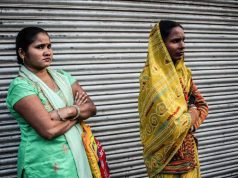UN Foundation Initiative Girl Up Joins Call for Active Measures to Combat Rape
Recent reports indicate that after an initial dip, violence against women has been steadily rising with the relaxation of the COVID-19 lockdown. There has been a significant increase in cybercrime against women, especially sextortion where “caged criminals” have been targeting them online. The most alarming trend has been of rapes being committed by family, friends, and neighbours. According to experts, reduced mobility, confinement within the household and lack of social connectivity during the outbreak has only changed the nature of sexual violence temporarily and there is bound to be a surge in the number of rape cases as the country opens up further.
Taking note of the expected surge in rape & sexual offences as the COVID-19 restrictions are gradually lifted, subject matter experts from fields of criminal law, forensics, and policy, came together with luminaries from the civil society on a common platform calling for active measures to raise awareness for a citizen’s role in combating rape and expediting justice through forensic DNA technology.
This message was supported by Girl Up, an initiative of the United Nations Foundation, a movement to advance the rights of adolescent girls around the world. Members of the forum underlined the need for public consciousness on the subject, not only to put sexual predators behind bars but to also deter such crimes.
Addressing the forum, Aditi Arora, Country Manager, Girl Up India said, “Violence against women and girls is a global pandemic and affects 1 in 3 women in their lifetime. It stems from unequal power relationships within families, communities, and states. As advocates for the rights, skills, and opportunities of every girl, Girl Up leaders are developing girl-led solutions to combat gender-based violence in their own lives and communities – from addressing sexual assault through advocacy and the creation of safe spaces, to developing tech solutions that build community awareness – but there is still so much more to do. Girl Up India is honoured to partner with Ogilvy and GTH-GA to spread the word on the use of DNA technology for combating heinous crimes like rape and work to dismantle rigid gender norms and stereotypes.”
Emphasising on the importance of heightened awareness for DNA forensics as a deterrent during these times, Nishtha Satyam, Deputy Country Representative, UN Women India said, “The conviction rate in cases of rape and sexual assault are very low, with only about one in 4 rape cases resulting in a conviction. This further amplifies endemic impunity for sexual offenders across the country. From a prevention perspective, increasing the certainty of conviction can act as an effective deterrent. DNA forensic technology can be used to identify offenders with incredible accuracy, make a case water-tight, and increase rates of prosecution.”
Sr Advocate, Supreme Court of India, Vivek Sood added, “Delay, rampant perjury by witnesses, apart from separating the chaff and grain from the evidence are amongst the challenges being faced by the criminal courts today. Though DNA evidence has arrived, the courts must insist on using it in many more cases than the present numbers.”
Addressing apprehensions over how the fear of being caught can encourage sexual predators to commit murder and destroy evidence, forensic expert Dr Vivek Sahajpal pointed out that killing and burning bodily evidence does not prevent DNA extraction and conviction of the guilty. There is always a good chance of getting some biological traces like skin cells, hair, and blood of the accused from the nail crevices of the victim and from the crime scene.
Despite rising crime, declining conviction rates, and an unprecedented backlog of cases in courts, there is huge unmet potential for DNA casework in India. Official statistics show a dramatic increase in the number of crimes against women, which have shot up from 24,923 in 2012 to 33,356 in 2018 – a jump of 34 per cent. As per NCRB data, one woman is raped every 15 minutes in India, whereas only one in four reported rape cases results in conviction.
Over the last couple of years, increasing awareness of forensic DNA technology in India has led to the doubling of the number of DNA tests conducted in criminal cases from 10,000 cases in 2017 to nearly 20,000 in 2019.1 However, despite growth in the number of profiles being tested, the absolute volume remains low, especially in crimes against women and children.
The webinar was co-hosted by Girl Up and Ogilvy as part of an ongoing initiative #DNAFightsRape that was launched on the International Day for the Elimination of Violence Against Women last year to raise awareness for application of DNA forensics in expediting justice for women and children who’ve been victims of sexual violence. The campaign has been mobilising the youth with symbolic ‘Don’t Wash, Don’t Clean. Save the Evidence’ T-shirts to bring home the message.
Disclaimer: This media release is auto-generated. The CSR Journal is not responsible for the content.












